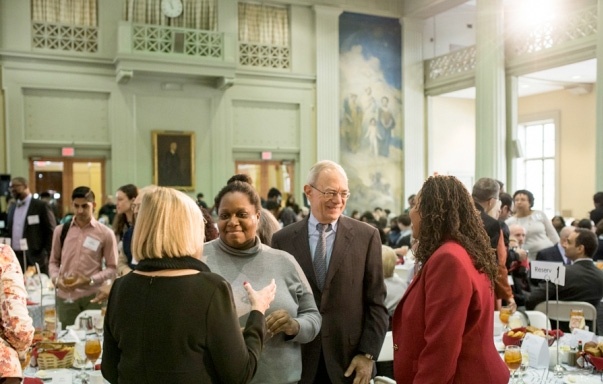“Discrimination affects us all”
“Discrimination affects us all”
David L. Chandler | MIT News Office February 16, 2017
Celebration of MLK features NASA mission manager Aprille Joy Ericsson ’86.

Aerospace engineer Aprille Joy Ericsson ’86, Instrument Project Manager at NASA’s Goddard Space Flight Center in Maryland and an alumna of MIT’s Department of Aeronautics and Astronautics, recalled Wednesday how a conversation with Martin Luther King Jr. affected a Hollywood actress’s career decision — and in turn helped to inspire Ericsson and many others of her generation to enter the world of aerospace engineering.
Nichelle Nichols, the actress who played Lieutenant Uhura on the original Star Trek series, was not under contract, Ericsson explained in her keynote talk at MIT’s 43rd annual celebration of King’s life and work. “King shared with her that Star Trek was one of the few TV shows he would let his children watch, primarily because of her role as chief technical officer on the Starship Enterprise,” which was so different than most portrayals of African-American women on television. After her conversation with King, Nichols reconsidered her plans to leave the show. She went on to provide a role model that Ericsson said helped propel her and many others into a career in the space program.
“Space travel has become a routine part of our daily lives,” though it remains a dangerous occupation, Ericsson said. Recalling the daring commitment that President John F. Kennedy made, launching the U.S. toward landing on the moon, “I believe that challenge is before us again,” she said.
Ericsson graduated from MIT just four months after the first space shuttle disaster, the Challenger accident in 1986. She earned her doctorate at Howard University and soon after went to work for NASA. “I followed my dream to explore space,” she says. But that road was not without its obstacles. “Discrimination affects us all,” she said. And yet, “inclusion of women and minorities” in working teams of all kinds, “is imperative. When I work with science and engineering teams, I know that each one on that team is important.”
“We scientists are agents of change,” she said. “Let’s embrace [Star Trek creator] Gene Roddenberry’s vision of diversity in space. We must work together across the differences of skin color, gender, and religion. … We are making this journey together, in a drive to make this world a better place.”